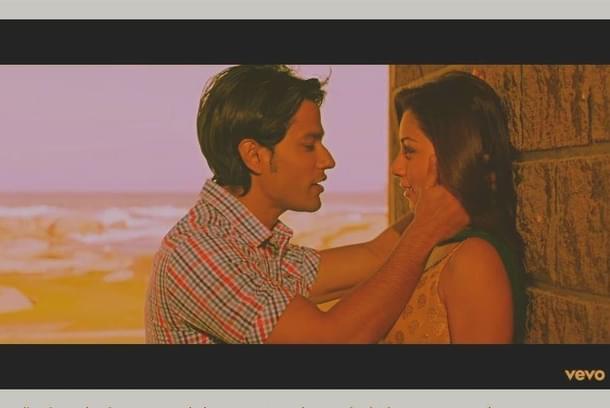Ideas
Explained: The Rahat Fateh Ali Khan Song That Got Wannabe Tik Tok Stars Hooked
Harsha Bhat
May 19, 2020, 10:08 PM | Updated 10:08 PM IST
Save & read from anywhere!
Bookmark stories for easy access on any device or the Swarajya app.


Recently, one song has gained notoriety with umpteen TikTok duet videos being made to fit the lyrics.
The lyrics in question are of a song from the movie Blood Money. It was sung by Pakistani singer Rahat Fateh Ali Khan and goes ‘Teri rooh pe, tere jism pe, bas haq hai ik mera’. (I alone have the rights on your body and your soul). Well, the one who penned this song, Sayeed Quadri is an ‘award winning’ lyricist of ‘Bheege hont tere’ fame, whose journey of penning songs for Hindi cinema began with Mahesh Bhatt productions like Jism, Saaya, Paap, and the famous Murder franchise.
In the TikTok videos that went viral, as the lyrics fade in, a girl is pulling up the sleeve of her blouse helplessly while the male on the other half of the screen, at times more than one, is shoving his arrogance to the viewer, and either zipping up his pant, has his shirt unbuttoned or mocking the woman whose ‘modesty he has clearly and intentionally outraged’ — in all, taking pride in having done what he has.
And it is in this that the subtlety of the not-so romantic emotion in these lines is made evident in the most outrageous, yet honest portrayal of what such lines mean to an average semi-literate Hindi film viewing ‘wannabe’ youth that clearly ‘knows not any better’.
One of the women in these viral videos, Twinckal Tanija, has now deleted all her videos but her profile speaks volumes of the reach of such material on the platform.
The said girl has 193.4k followers on TikTok. Her YouTube channel, meanwhile, has just 10 subscribers and one video of her belly dancing in front of some gathering to a Bollywood song.
But this has highlighted the power of these pseudo-romantic, pseudo-sufi lyrics that have been a trend in Bollywood for sometime now.
It can’t be a coincidence that the famous TikTok users, now emerging, are predominantly those who believe in an ideology that denies women any right over their body, and their identity.
While the subdued woman, who is left tattered, is someone who is very clearly not from the same ‘religion’ as is very evidently seen wearing loud visual symbols that define her identity, the male has the backing of the school of thought that grants to men sole propriety over the female body and her very existence.
Sure, if you say there is no need to read too much into it, you can chose not to. But these on-so-naive ‘influencers’ out there are reading it that way, and justifying it too.
“I am the sole ‘owner’ or possess the rights over — thy body, thy ‘soul’, thy time, and they very being” — As poetic as one tries to make this ‘song’, it is plain violent and forceful subjugation of a woman to just a piece of life that is to cater to the male, both person and ego who can ‘do as he pleases’.
And all this freedom has been granted to him on demand by virtue of being her ‘lover’. And the qualifying criteria that distinguishes him from being a rapist — though the video is all about him being the latter — is the hyper liberal sprinkling of those Bollywood Urdu words that make anyone a poet.
So, rape, BDSM, marital rape, eve-teasing, or any such ‘rightful’ display of the hormonal kidnap of human discretion is termed ‘love’ the moment you decorate it with ‘chahat’ love, ‘ibaadat’ worship, and some more rhyming ones.
If one were to dissect the lyrics of this very song, for even half a sensible feminist, or even if you claim to be a humanist, it is nothing short of a nightmare.
The chorus that catches the attention is the single thought running through the song and the thought that finds resonance and makes them popular. So the man, the obsessive lover, has decided, that the girl and any power of her thinking for herself can take a hike as he is the ‘only one’ who will call the shots.
‘Yaadon main tujhko rakhoon,
baatein main teri karoon,
itna deevana hoon tera’
So he keeps her in his thoughts, talks only about her, this is how crazy he is about her’. And the following lines add that he is an insomniac and loiters around all day. And hence, the chorus that he has every right to own her, her love, her body etc.
Conveniently, placard-holding Bollywood feminists find it all mushy and ‘possessive’ and absolutely divine and go mute when the influence of their work is clearly having ripple effects that are clearly otherwise.
But naivete is a virtue and a weapon used conveniently in an industry that otherwise has all the time to find faults and ‘protest’ against the ‘system’.
Multiple renditions of this so called ‘duet’ have followed as TikTok permits anyone to make ‘duet’ videos with anyone.
So, for the benefit of doubt to be granted to these naive women out there, you always have the tool of saying the video was taken ‘out of context’.
And that will be the defence used to justify such senseless media content that is being watched by millions’ and replicated too.
TikTok got the attention of a large part of the subcontinent during the lockdown. In a country that boasts of the largest cinema industry in the world by sheer numbers, and a society characterised by hero worship and deification of ‘actors’ that defies rationality, this was an easy goal for the said app.
That almost every third person who lands in cine-town Mumbai is the one who hosts dreams of being an actor testifies the surge in TikTok users in the country as everyone, practically everyone, could now be an ‘actor’.
This psychological need to be seen, and more importantly mouthing lines or lyrics that have been portrayed by the onscreen larger-than-life characters, could now be met.
An unregulated affair like this, which seemingly carries the stamp of approval by those who profiteer from the reel life, is also likely to fuel such activity in society too.
And this ‘cinematised reality’, undoubtedly not fiction, is indeed scary.
Harsha Bhat is an author, linguist, content strategist, and a compulsive chronicler of Bharat's civilisational heartbeat.





